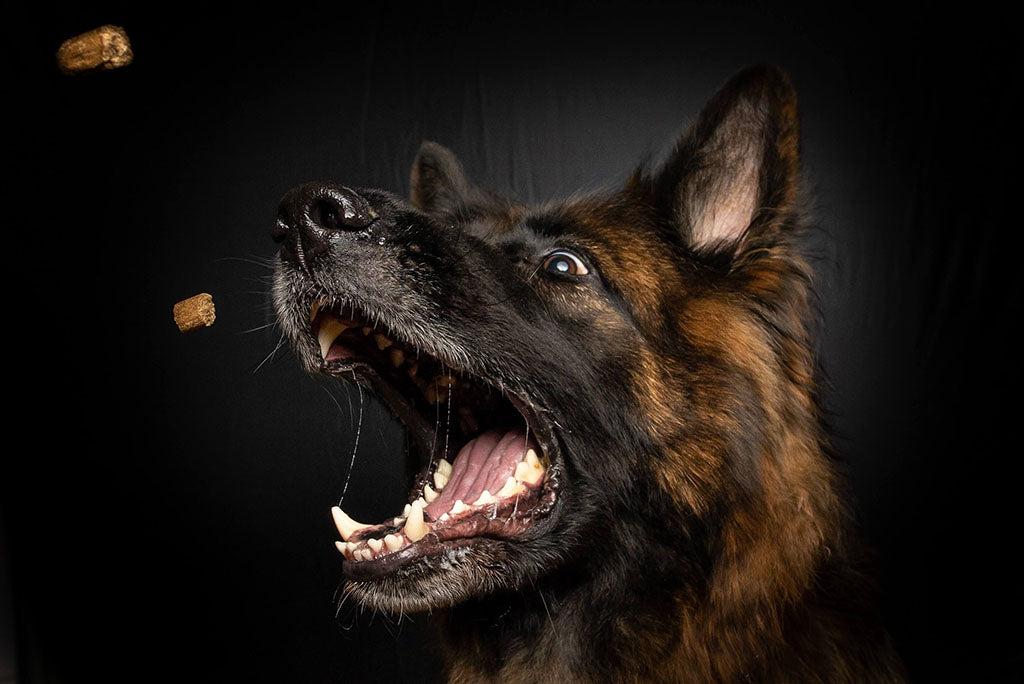Summary: In this blog, we’ll learn how the dog digestive system works and how long it takes a dog to digest food, as well as some other interesting facts… Whenever we eat food, our body has to process it to take the nutrients it needs from it and then generate it into waste. The same […]
- Home/
- Dog/
- Health & Wellness/
- All You Need To Know About The Dog Digestive System
All You Need To Know About The Dog Digestive System

Summary: In this blog, we’ll learn how the dog digestive system works and how long it takes a dog to digest food, as well as some other interesting facts…
Whenever we eat food, our body has to process it to take the nutrients it needs from it and then generate it into waste. The same goes for your dog…
Dog Digestive System
Like a human’s, the dog’s digestive system starts doing its thing from the moment food enters the mouth. As it moves through the body, the system takes what it needs nutrient-wise from the food and distributes those vitamins and minerals accordingly. It then processes what’s left as waste.
The first part of this process takes place in the mouth, when the enzymes present in the saliva begin to break down the food as your dog chews with their teeth.
PetLab Co. Pro Tip: Did you know that a dog can only chew on one side at once!? Their jaw won’t allow them to move food from side to side like ours can.
Then, your dog’s food, snack, or treat will travel down their esophagus (throat) and enter the stomach. Here, the acid present in the stomach breaks down the food further.

From the stomach, the food then enters the intestines – both small and large, but the small receives the food first. The small intestine absorbs the most nutrients from the food in the whole of the dog’s digestive system – these are absorbed into the intestine’s walls and passed into the blood which carries them throughout the body to be used where needed. The liver is responsible for metabolizing these nutrients.
Bile from your dog’s gallbladder is combined with the food to bind it and neutralize any residual stomach acid. The pancreas also produces enzymes that are used to help further break down the food and quicken the digestive and absorption process.
After this, the remains of the food that has been drained of nutritional value reaches the large intestine. Any water left in the food is drained by the large intestine, before being passed through toward the rectum and formed into a stool. The waste stays in the rectum until there is enough to trigger your dog’s physical urge to poop. Once your dog has pooped, that’s considered the completed process of the dog’s digestive system.
PetLab Co. Pro Tip: When a dog finishes eating, a dog produces much more acid in their stomach than a human does. This means, like us, they’re susceptible to things like indigestion and heartburn – where the acid creeps up the esophagus. This may cause them to burp, or in severe cases cause them discomfort that can lead to vomiting, lip or air licking, or whining when they swallow. If you spot any of the severe signs, do check in with your vet who may be able to help with a doggy antacid.

How Long Does It Take A Dog To Digest Food?
A dog’s digestive system process can take anywhere between 6 to 8 hours, which is nearly three times as fast as a human’s! However, this will vary depending on your dog’s size, breed, age, how hydrated they are and their current health status. For example, a puppy will usually have a much faster digestive system than an older dog.
The food itself also significantly influences how quickly it is processed by your dog’s body. Wet will digest at a much quicker rate than dry food and the higher the quality of the food, the more easily this will be processed by your dog too – this can be identified by the quality of your dog’s stool.
The consistency of a pup’s poop should be reasonably firm, and if you’re not sure of how it would feel…You might have to feel it! Of course, use a plastic bag or some gloves, but if the stool is rock hard or lacks firmness, the intestines may not be working properly, your dog could be dehydrated or the quality (and thus digestibility) of your dog’s food could be improved. You can learn about what makes a desirable dog stool in this blog here.
The best protein and meal type for digestibility in dogs is argued to be fish or chicken, but it’s generally agreed that it’s best to mix up their source of protein but to try and stick to the same brand of food to avoid unnecessary stomach upset. If you are looking to switch your dog’s food, learn how to safely do so in this blog here.
Sources
Author Dr. Miller, Andrew MRCVS “How Long Does It Take For A Dog To Digest Food?” Pure Pet Food, May 13. 2020 https://www.purepetfood.com/blog/how-long-does-it-take-a-dog-to-digest-food
“7 Interesting Facts About Your Dog’s Digestive System” Pet MD, Sep 29. 2017 https://www.petmd.com/dog/nutrition/7-interesting-facts-about-your-dogs-digestive-system
 S
S



